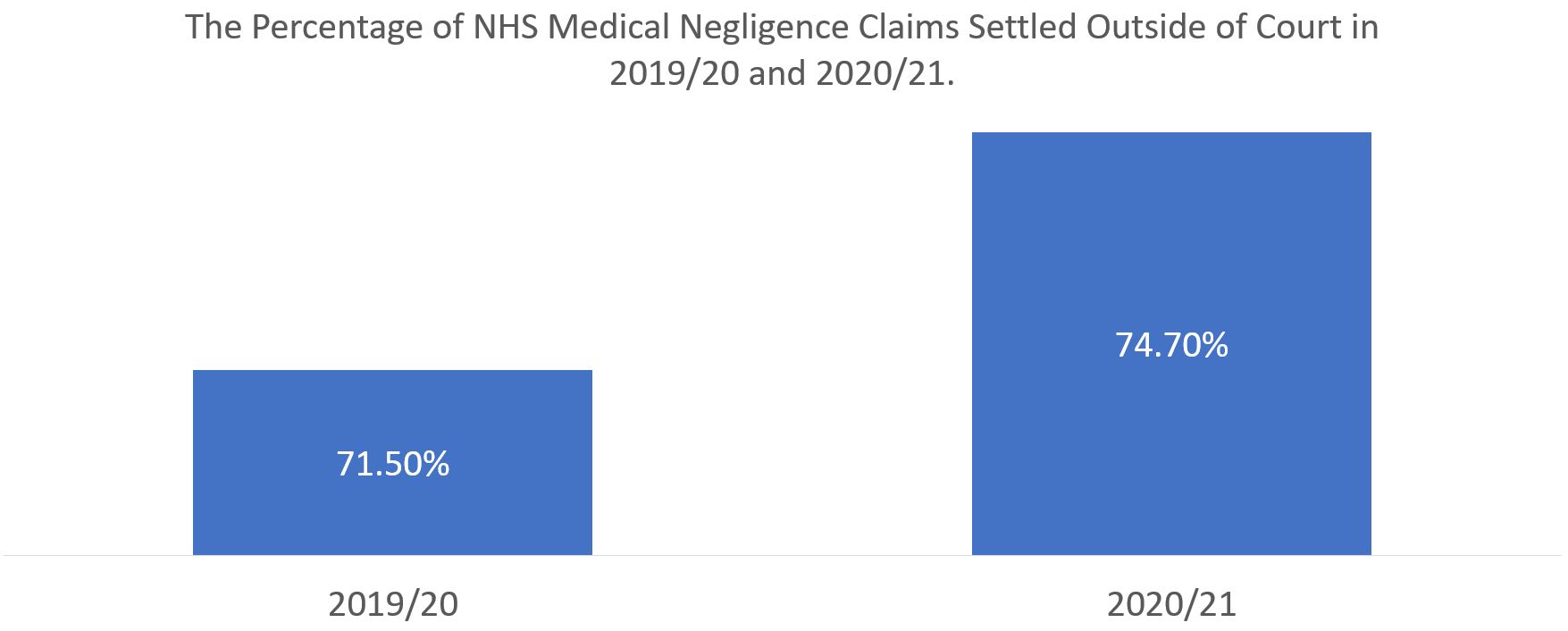In this guide, we’ll look at the medical negligence claims process. When you seek medical attention, you’re entitled to a minimum standard of care. If this standard is deviated from, and the care you receive is of an unacceptable level, this is an example of medical negligence.

Medical negligence claims guide
Before reading further, you might have queries such as:
- How much medical negligence compensation could I get?
- What harm could be caused by negligent medical care?
- How could a No Win No Fee solicitor benefit me?
You can get in touch with our team of advisors for free legal advice. If you have a legitimate claim, an adviser can connect you to an expert data breach lawyer from our panel. They can then chat with you about No Win No Fee agreements and begin the clinical negligence claims process.
We suggest you get in touch with our team of advisers via:
- A telephone call on the number above to receive free legal advice.
- Our live chat box to receive an instant response.
- Our claims form to get a reply at your earliest convenience.
Choose A Section
- What Is Medical Negligence And How Does It Happen?
- Eligibility In Medical Negligence Claims
- Medical Negligence Compensation Payout Examples
- Work With No Win No Fee Medical Negligence Solicitors
- Discover More About Medical Negligence Claims
What Is Medical Negligence And How Does It Happen?
All medical professionals owe their patients a duty of care. This applies whether you’re seeking medical attention at an NHS facility or from a private healthcare provider.
The duties of a good doctor are set out by the General Medical Council. If a medical professional breaches the duty of care that they owe you, then this could cause you injury or a worsening of your condition. You may be able to claim for this.
Here are some examples of the forms that medical negligence could take:
- Misdiagnosis – If you receive a misdiagnosis, you won’t receive the correct treatment. This could lead to your injury becoming worse. You might also get treatment for a condition you do not have that harms you.
- Lack of informed consent – You need to be fully informed about the risks of any procedures you undergo. For example, you might undergo laser eye surgery but not be told about the risk that this can have to damage your eyesight. If this does affect your eyesight, and you wouldn’t have had the procedure if you were aware of the risks, then you may be able to claim.
- Surgery errors – For example, this might include the wrong part of your body being operated on, a foreign object being left in the patient’s body or an avoidable infection being contracted because tools that were not clean were used.
It’s important to note that just because you’re caused harm in the course of receiving medical treatment, it doesn’t mean you’re eligible to claim. Sometimes, complications can occur even when the right level of care is delivered. You need to have been harmed because of negligent medical care in order to be eligible to receive compensation.
Medical Negligence Statistics
The table below includes NHS statistics showing the percentage of NHS medical negligence claims settled outside of court in 2019/20 and 2020/21. As shown, 71.5% of claims were settled outside of court in 2019/20. In 2020/21, 74.7% were settled outside of court.
Claims that go to court are expensive and lengthy, so solicitors will often try to avoid this. A claim can go to court if the defendant doesn’t admit liability. It can also go to court if liability is admitted, but there’s a dispute about how much compensation should be awarded.

Eligibility In Medical Negligence Claims
In order to make a medical claim, there must have been a duty of care breach that caused you harm. This harm could be a new injury or illness or a worsening of your condition that you would not have experienced if you had received the right level of care.
The Bolam test will usually be carried out to determine whether the care the healthcare professional provided you was of an acceptable standard. This involves a panel of the medical professional’s peers being asked whether or not the care administered was of an acceptable standard. If not, the doctor would be considered negligent, and you may be able to claim.
What Is The Medical Negligence Claims Time Limit?
The Limitation Act 1980 states that the general medical negligence claims time limit is three years. This means you have a time period of three years to start a claim, which runs from the exact date the negligence occurred or the date you realise that negligence caused or contributed to your symptoms.
However, sometimes this time limit varies. For example, if you’re under 18, the time limit starts when you turn 18. However, if you want to claim sooner, someone you know can claim for you by becoming a litigation friend and the time limit is suspended until you come of age.
Similarly, the three-year medical negligence claims time limit is suspended for mentally incapacitated claims. If you lack the mental capacity to begin a claim, the time limit restarts in the event that you recover. However, somebody who you trust can act as a litigation friend to claim on your behalf sooner than this if you’d prefer.
Medical Negligence Compensation Payout Examples
We’ve included the below compensation table to show the amount of compensation you could be awarded for your injury. The figures are taken from the most recent version of the Judicial College Guidelines. Please bear in mind that these are guideline compensation amounts and that the actual amount you receive might vary.
| Injury: | Severity: | Notes: | Compensation: |
|---|---|---|---|
| Injuries to the Pelvis and Hips | Severe (i) | The joint in the lower back may be dislocated and the bladder could have ruptured. This may make it hard to control the bladder and bowel. | £73,580 to £122,860 |
| Injuries to the Pelvis and Hips | Moderate (i) | The hips or pelvis will be injured significantly but no major permanent disability results. | £24,950 to £36,770 |
| Knee Injuries | Severe (i) | This knee injury is serious and has resulted in joint disruption, damage to the ligaments, long-term treatment, and function loss accompanied by considerable pain. | £65,440 to £90,290 |
| Knee Injuries | Moderate (i) | The cartilage may be torn and the knee may be dislocated, which may result in mild disability in the future. | £13,920 to £24,580 |
| Ankle Injuries | Very Severe | The ankle may have a transmalleolar fracture accompanied by damage to the soft-tissue. This may result in deformity and the possible need for below-knee amputation if future ankle injury occurs. | £46,980 to £65,420 |
| Ankle Injuries | Moderate | Torn ligaments and fractures that result in mild disabilities, for example, trouble walking when the ground is even, and finding it difficult to walk up and down stairs. | £12,900 to £24,950 |
| Foot Injuries | Amputation of Both Feet | This means a useful joint of the ankle is lost, which is why the awarded bracket is similar to below-knee amputation. | £158,970 to £189,110 |
| Severe | Severe | Both feet or heels are fractured, which significantly restricts mobility and causes permanent, considerable pain. | £39,390 to £65,710 |
The above compensation figures represent general damages. This is the bracket that you receive for the pain and suffering that your injuries have caused you. It’s based on the results of an independent medical expert that you’ll attend as part of your claim.
The way your finances are impacted by your injury is compensated by special damages. An example of this could be if you paid for travel to and from medical appointments out of your own pocket, if you’ve taken time off work because of your injuries, or if you’ve had to pay for treatment that you cannot get on the NHS. You’ll need to provide evidence to support your claim for special damages; otherwise, you may not receive the full amount you’re entitled to.
For more information on the costs and expenses that medical negligence claims can cover, why not speak with one of our advisors today? If you have a valid claim, you could be connected with a No Win No Fee solicitor from our panel to represent you.
Work With No Win No Fee Medical Negligence Solicitors
Our medical negligence solicitors would be happy to speak with you about No Win No Fee agreements. A No Win No Fee agreement, also called a Conditional Fee Agreement (CFA), is an agreement between you and your lawyer that sets out the things they need to achieve before asking you for payment.
It states that you won’t have to pay your solicitors fees if your claim is unsuccessful. You also won’t be asked to pay them upfront or while they’re working on your claim.
If your claim succeeds, a small percentage will be deducted from your compensation by your solicitor. You will have already been made aware of this percentage beforehand.
Please don’t hesitate to contact our knowledgeable and friendly team of advisers, who will then answer any queries you have about the medical negligence claims process. If your claim is valid, an adviser may also be able to connect you to a medical negligence lawyer from our team. They can then discuss No Win No Fee agreements with you and begin working on your claim.
You can contact our team of advisers by:
- Giving them a call on the above number to have a chat about your case.
- Filling out our online claims form with your information to get a response when you’re next available.
- Talking to an adviser on our instant live chat to get a reply immediately.
Discover More About Medical Negligence Claims
Having an Operation (Surgery) – If you’d like more information about surgery, this NHS guide can help you.
How Do I Know If I’ve Broken A Bone? – If you suspect you may be suffering from a bone fracture, this NHS article includes helpful information.
General Medical Council– This is the regulatory body for doctors in the UK. They set the standards of care and investigate complaints about the quality of medical care.
Thank you for reading our article about medical negligence claims.

